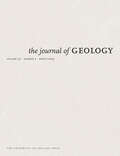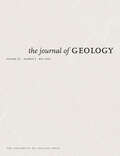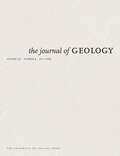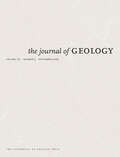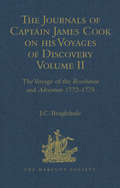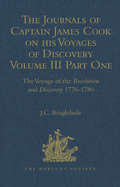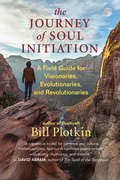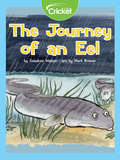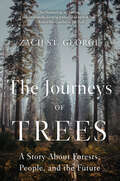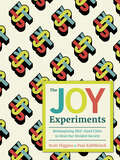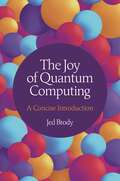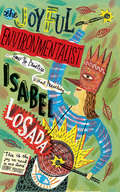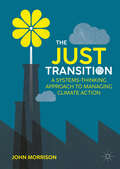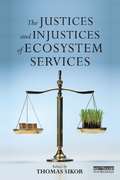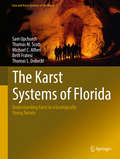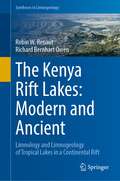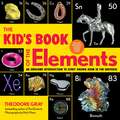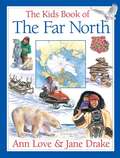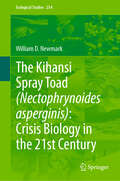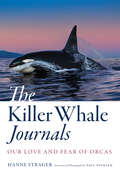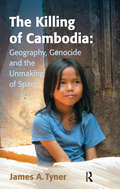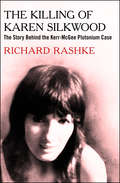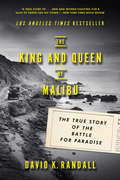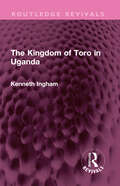- Table View
- List View
The Journal of Geology, volume 131 number 2 (March 2023)
by The Journal of GeologyThis is volume 131 issue 2 of The Journal of Geology. One of the oldest journals in geology, The Journal of Geology has since 1893 promoted the systematic philosophical and fundamental study of geology. The Journal publishes original research across a broad range of subfields in geology, including geophysics, geochemistry, sedimentology, geomorphology, petrology, plate tectonics, volcanology, structural geology, mineralogy, and planetary sciences. Many of its articles have wide appeal for geologists, present research of topical relevance, and offer new geological insights through the application of innovative approaches and methods.
The Journal of Geology, volume 131 number 3 (May 2023)
by The Journal of GeologyThis is volume 131 issue 3 of The Journal of Geology. One of the oldest journals in geology, The Journal of Geology has since 1893 promoted the systematic philosophical and fundamental study of geology. The Journal publishes original research across a broad range of subfields in geology, including geophysics, geochemistry, sedimentology, geomorphology, petrology, plate tectonics, volcanology, structural geology, mineralogy, and planetary sciences. Many of its articles have wide appeal for geologists, present research of topical relevance, and offer new geological insights through the application of innovative approaches and methods.
The Journal of Geology, volume 131 number 4 (July 2023)
by The Journal of GeologyThis is volume 131 issue 4 of The Journal of Geology. One of the oldest journals in geology, The Journal of Geology has since 1893 promoted the systematic philosophical and fundamental study of geology. The Journal publishes original research across a broad range of subfields in geology, including geophysics, geochemistry, sedimentology, geomorphology, petrology, plate tectonics, volcanology, structural geology, mineralogy, and planetary sciences. Many of its articles have wide appeal for geologists, present research of topical relevance, and offer new geological insights through the application of innovative approaches and methods.
The Journal of Geology, volume 131 number 5 (September 2023)
by The Journal of GeologyThis is volume 131 issue 5 of The Journal of Geology. One of the oldest journals in geology, The Journal of Geology has since 1893 promoted the systematic philosophical and fundamental study of geology. The Journal publishes original research across a broad range of subfields in geology, including geophysics, geochemistry, sedimentology, geomorphology, petrology, plate tectonics, volcanology, structural geology, mineralogy, and planetary sciences. Many of its articles have wide appeal for geologists, present research of topical relevance, and offer new geological insights through the application of innovative approaches and methods.
The Journals of Captain James Cook on his Voyages of Discovery: Volume II: The Voyage of the Resolution and Adventure 1772-1775 (Hakluyt Society, Extra Series)
by J.C. BeagleholeCaptain James Cook’s first two voyages of exploration, in 1768-71 and 1772-75, had drawn the modern map of the South Pacific Ocean and had opened the door on the discovery of Antarctica. These expeditions were the subject of Volumes I and II of Dr J.C. Beaglehole’s edition of Cook’s Journals. The third voyage, on which Cook sailed in 1776, was directed to the Northern Hemisphere. Its objective was the discovery of ’a Northern Passage by sea from the Pacific to the Atlantic Ocean’ - the North-west Passage, sought since the 16th century, which would have transformed the pattern of world trade. The search was to take Cook into high latitudes where, as in the Antarctic, his skill in ice navigation was tested. Sailing north from Tahiti in 1778, Cook made the first recorded discovery of the Hawaiian Islands. On March 7 he sighted the Oregon coast in 44° N. The remarkable voyage which he made northward along the Canadian and Alaskan coasts and through Bering Strait to his farthest north in 70° nearly disproved the existence of a navigable passage towards the Atlantic and produced charts of impressive accuracy. Returning to Hawaii to refit, Cook met his death in a clash with the natives as tragic as it seems unnecessary. Dr Beaglehole discusses, with sympathy and insight, the tensions which led Cook, by then a tired man, into miscalculations alien to his own nature and habits. The volume and vitality of the records, both textual and graphic, for this voyage surpass those even for Cook’s second voyage. The surgeons William Anderson and David Samwell, both admirable observers, left journals which are also here printed in full for the first time. The documentation is completed, as in the previous volumes, by appendixes of documents and correspondence and by reproductions of original drawings and paintings mainly by John Webber, the artist of the expedition. In Dr Beaglehole’s words, ’no one can study attentively the records of Cook’s third, and last, v
The Journals of Captain James Cook on his Voyages of Discovery: Volume III, Part I: The Voyage of the Resolution and Discovery 1776-1780 (Hakluyt Society, Extra Series)
by J.C. BeagleholeCaptain James Cook’s first two voyages of exploration, in 1768-71 and 1772-75, had drawn the modern map of the South Pacific Ocean and had opened the door on the discovery of Antarctica. These expeditions were the subject of Volumes I and II of Dr J.C. Beaglehole’s edition of Cook’s Journals. The third voyage, on which Cook sailed in 1776, was directed to the Northern Hemisphere. Its objective was the discovery of ’a Northern Passage by sea from the Pacific to the Atlantic Ocean’ - the North-west Passage, sought since the 16th century, which would have transformed the pattern of world trade. The search was to take Cook into high latitudes where, as in the Antarctic, his skill in ice navigation was tested. Sailing north from Tahiti in 1778, Cook made the first recorded discovery of the Hawaiian Islands. On March 7 he sighted the Oregon coast in 44° N. The remarkable voyage which he made northward along the Canadian and Alaskan coasts and through Bering Strait to his farthest north in 70° nearly disproved the existence of a navigable passage towards the Atlantic and produced charts of impressive accuracy. Returning to Hawaii to refit, Cook met his death in a clash with the natives as tragic as it seems unnecessary. Dr Beaglehole discusses, with sympathy and insight, the tensions which led Cook, by then a tired man, into miscalculations alien to his own nature and habits. The volume and vitality of the records, both textual and graphic, for this voyage surpass those even for Cook’s second voyage. The surgeons William Anderson and David Samwell, both admirable observers, left journals which are also here printed in full for the first time. The documentation is completed, as in the previous volumes, by appendixes of documents and correspondence and by reproductions of original drawings and paintings mainly by John Webber, the artist of the expedition. In Dr Beaglehole’s words, ’no one can study attentively the records of Cook’s third, and last, v
The Journey of Soul Initiation: A Field Guide for Visionaries, Evolutionaries, and Revolutionaries
by Bill PlotkinSoul initiation is an essential spiritual adventure that most of the world has forgotten — or not yet discovered. Here, visionary ecopsychologist Bill Plotkin maps this journey, one that has not been previously illuminated in the contemporary Western world and yet is vital for the future of our species and our planet. Based on the experiences of thousands of people, this book provides phase-by-phase guidance for the descent to soul — the dissolution of current identity; the encounter with the mythopoetic mysteries of soul; and the metamorphosis of the ego into a cocreator of life-enhancing culture. Plotkin illustrates each phase of this riveting and sometimes hazardous odyssey with fascinating stories from many people, including those he has guided. Throughout he weaves an in-depth exploration of Carl Jung&’s Red Book — and an innovative framework for understanding it.
The Journey of an Eel
by Galadriel WatsonThe freshwater eel is a fish that makes two remarkable journeys, one at the beginning of its life, and another at the end. It is born in the ocean, lives its adult life in a freshwater stream, then returns to the ocean.
The Journeys of Trees: A Story About Forests, People, And The Future
by Zach St. GeorgeAn urgent and illuminating portrait of forest migration, and of the people studying the forests of the past, protecting the forests of the present, and planting the forests of the future. Forests are restless. Any time a tree dies or a new one sprouts, the forest that includes it has shifted. When new trees sprout in the same direction, the whole forest begins to migrate, sometimes at astonishing rates. Today, however, an array of obstacles—humans felling trees by the billions, invasive pests transported through global trade—threaten to overwhelm these vital movements. Worst of all, the climate is changing faster than ever before, and forests are struggling to keep up. A deft blend of science reporting and travel writing, The Journeys of Trees explores the evolving movements of forests by focusing on five trees: giant sequoia, ash, black spruce, Florida torreya, and Monterey pine. Journalist Zach St. George visits these trees in forests across continents, finding sequoias losing their needles in California, fossil records showing the paths of ancient forests in Alaska, domesticated pines in New Zealand, and tender new sprouts of blight-resistant American chestnuts in New Hampshire. Everywhere he goes, St. George meets lively people on conservation’s front lines, from an ecologist studying droughts to an evolutionary evangelist with plans to save a dying species. He treks through the woods with activists, biologists, and foresters, each with their own role to play in the fight for the uncertain future of our environment. An eye-opening investigation into forest migration past and present, The Journeys of Trees examines how we can all help our trees, and our planet, survive and thrive.
The Joy Experiments: Reimagining Mid-sized Cities to Heal Our Divided Society
by Scott Higgins Paul KalbfleischA new perspective on developing shared joy in urban spaces.Our divided society is quickly reaching crisis level. We are no longer able to sustain social and economic prosperity nor ensure democracy. Fuelling this crisis is a growing sense of social isolation caused by the divisive nature of social media and the decline of infrastructure that used to bring communities together.But there is hope for rebuilding our collaborative society, and it is found in our mid-sized urban areas. These towns and cities offer a scale that can tangibly change the quality of our lives and an intimacy that allows us to influence what our communities can become. Changing cities can change the world!In The Joy Experiments, real estate developer Scott Higgins and creative mind Paul Kalbfleisch use their own mid-sized city-building experiences to present a new way for citizens to engage with their city, and an urban planning strategy that prioritizes infrastructure for the human spirit.
The Joy of Quantum Computing: A Concise Introduction
by Jed BrodyAn engaging and accessible presentation of the most famous algorithms and applications of quantum computingThe Joy of Quantum Computing introduces quantum computing succinctly, and with minimal mathematical formalism. Engagingly written—a feast for the reader&’s inner nerd—it presents the most famous algorithms and applications of quantum computing and quantum information science, including the &“killer apps,&” Grover&’s search algorithm, and Shor&’s factoring algorithm. The only prerequisite is precalculus; readers need no knowledge of quantum physics. Matrices are relegated to the (completely optional) final two chapters. The book shows readers that quantum information science is about more than just high-speed calculations and data security. It is also about the fundamental meaning of quantum mechanics and the ultimate nature of reality.The Joy of Quantum Computing is suitable for classroom use or independent study by questing autodidacts.• Offers detailed explanations of quantum circuits, quantum algorithms, and quantum mysteries• Explains how to apply quantum information science to cryptography (and how Shor&’s algorithm menaces classical cryptography)• Introduces the mystifying topics of quantum teleportation and the no-cloning theorem• Discusses Bell inequalities, which permit experimental tests of philosophical assumptions• Presents a simple model of quantum decoherence, shedding light on Schrödinger&’s mysterious cat
The Joyful Environmentalist: How to Practise without Preaching
by Isabel LosadaThe feel-good book of the year for everyone who loves our planet and is looking for solutions. Fast, funny and inspiring, too. Finally! A book about saving our planet that is fast, funny and inspiring too. Written in short chapters for busy people, Isabel doesn't bother with an examination of the problem but gets right on with the solutions. Her aim: to look for every single way we can take care of the planet; how we live and work, travel, shop, eat, drink, dress, vote, play, volunteer, bank - everything. And to do this wholeheartedly, energetically and joyfully. Beginning with losing her cool in a restaurant that will only provide plastic cutlery, Isabel journeys through native tree planting in the Highlands of Scotland, playing Samba drums with Extinction Rebellion, interviewing in person the people that supply her energy and food - through every solution she can find - until both narrator and reader are fully equipped to be part of the pollution solution.
The Just Transition: A Systems-Thinking Approach To Managing Climate Action
by John MorrisonManaging the climate transition will be one of the biggest challenges ever faced by business and government. While the technical and financial elements of climate transition are vast, the social challenges are even greater. If local populations and workers feel the transitions are not “just” they will resist, and that social opposition now represents one of the greatest barriers to reaching Net Zero by 2050. While the phrase ‘Just Transition’ was in the preamble to the 2015 Paris Climate Agreement, it is only now that business, finance and governments are starting to discuss what this might mean in practice. Thousands of companies are now starting to develop transition plans alongside those of governments. This book shows how all managers can best integrate social elements into these plans, consult with the people most affected by the transition out of the high carbon economy, and ensure that what looks good on paper works in practice. It takes a systems-thinking approach, focusing on the interconnections and interdependence of environmental, social and governance issues. The challenge is immense, and the changes will need to be profound. Each chapter in the book will look at the main domains in which management and policy challenges will be faced. From massively increasing the extraction of rare earth metals, most of which sit below, or adjacent to, indigenous land, to building the infrastructure needed to generate and distribute green energy, possibly over “Not in My Back Yard’ objections, the task of business and government in ensuring that these changes are fair, and perceived as fair, is immense. This book provides the roadmap for how to get there. Managing the social impacts of the climate transition will be one of the biggest challenges ever faced by business and government.
The Justices and Injustices of Ecosystem Services (Routledge Studies in Ecosystem Services)
by Thomas SikorHumankind benefits from a multitude of resources and processes that are supplied by ecosystems, and collectively these benefits are known as ecosystem services. Interest in this topic has grown exponentially over the last decade, as biologists and economists have tried to quantify these benefits to justify management interventions. Yet, as this book demonstrates, the implications for justice and injustice have rarely been explored and works on environmental justice are only now addressing the importance of ecosystem services. The authors establish important new middle ground in arguments between conservationists and critics of market-based interventions such as Payment for Ecosystem Services. Neither can environmental management be separated from justice concerns, as some conservationists like to believe, nor is it in fundamental opposition to justice, as critics like to put it. The book develops this novel interpretation of justice in environmental management through analyses of prominent governance interventions and the conceptual underpinnings of the ecosystem services framework. Key examples described are revenue-sharing around protected areas and REDD+ for forest ecosystems. The analyses demonstrate that interventions create opportunities for enhancing social justice, yet also reveal critical design features that cause ostensibly technical interventions to generate injustices.
The Kaguya Lunar Atlas: The Moon in High Resolution
by Charles A. Wood Motomaro ShiraoIn late 2007, the Japanese Space Exploration Agency (JAXA) placed the Kaguya/ Selene spacecraft in orbit around the Moon to probe the Moon’s surface and interior. But unlike previous lunar orbiters, Kaguya carries a high definition television camera (HDTV) sent beyond Earth orbit. Sponsored by the Japanese NHK TV network, the HDTV has amazed both scientists and the public with its magnificent views of the lunar surface. What makes these images so much more engaging than standard vertical view lunar photography is that they are taken looking obliquely along the flight path. Thus, they show the Moon as it would be seen by an astronaut looking through a porthole window while orbiting only 100 km above the lunar surface. This is the view we all would wish to have but are never likely to, except vicariously through the awe-inspiring Kaguya HDTV images. Each page features a HDTV image with a map of the entire Moon on the upper left showing where the image is located. On the upper right is a 100-150 word description. Seeing the Moon is not intended solely for lunar scientists who are striving to work out the mysteries of the Moon’s origin and evolution. Everyone can appreciate the natural beauty and be entranced by the view of the nearby world where humans may one day live.
The Karst Systems of Florida: Understanding Karst in a Geologically Young Terrain (Cave and Karst Systems of the World)
by Sam Upchurch Thomas M. Scott Michael C. Alfieri Beth Fratesi Thomas L. DobeckiThis book discusses the geology, hydrogeology, and water quality/geochemistry of karst systems in geologically young terrain, using the state of Florida as an example. Also discussed are sinkhole-development models; sinkhole risk; eogenetic karst features developed in rocks as young as 125,000 years and as old as 65 million years; and karst landscapes of Florida, including regional geology and geomorphology with important examples of karst features, such as springs, sinkholes, caves, and other karst landforms. The eogenetic karst of Florida is largely covered and this book extensively discusses the interactions of karst processes with sand- and clay-rich cover materials.
The Kenya Rift Lakes: Limnology and Limnogeology of Tropical Lakes in a Continental Rift (Syntheses in Limnogeology)
by Robin W. Renaut Richard Bernhart OwenThis book is the first comprehensive account of the modern Kenya Rift Valley lakes and their precursor lakes preserved in the sedimentary record. The first part gives the broad geological and environmental background to the Kenya Rift and a history of research. In the second part, each modern lake is described from perspectives of geology, limnology, ecology, sedimentology and late Quaternary history. The fossil lake sediments, some linked to hominin sites, and their paleoenvironmental history are considered in the third part. In the fourth section, the global tectonic, volcanic and climate controls of lake evolution in continental rifts are examined. The last section discusses the resource potential of the lakes and their sediments, and the environmental issues that currently affect the modern lakes. This research-level book (geology, paleoecology) is illustrated throughout by original figures and photographs.
The Kid's Book of the Elements: An Awesome Introduction to Every Known Atom in the Universe
by Theodore GrayA fun, fascinating, and amazingly photographic exploration of the periodic table, for curious kids who want to understand how atoms and elements make up everything in the universe.In this very special kids' edition of Theodore Gray's The Elements, budding scientists, ages 6 to 9, will learn all about every element in the periodic table from the first element, Hydrogen (1), to the very last element, Oganesson (118). Filled with great big colorful photographs and fun facts for every element, The Kid's Book of The Elements is the perfect introduction to the fascinating world of chemistry and visual/tactile-based STEM/STEAM learning. This edition also includes 120 sturdy tear-out cards of each element for kids to play with and arrange on their own.
The Kids Book of the Far North (Kids Book Of )
by Jane Drake Ann LoveThe Far North is a region shared by Canada, the U.S. (Alaska), Russia, Denmark (Greenland), Norway, Iceland, Sweden and Finland. For those who don't live there, the region appears to be a bleak, desolate place of snow, ice, glaciers and bitter cold. But the Far North is home to many plants, animals and people who have developed remarkable ways of adapting to one of the harshest climates on Earth. This book in the Kids Book of series examines the region's fascinating history, modern life and fragile ecosystem with facts, stories, legends, illustrations, timelines and maps.
The Kihansi Spray Toad (Ecological Studies #254)
by William D. NewmarkThe captive breeding and reintroduction of highly threatened species are among the most challenging conservation interventions and often represent the final tool in a comparatively small toolbox to conserve rapidly declining species. This book details the species recovery program that was designed and implemented over two decades to conserve the Kihansi Spray Toad (Nectophrynoides asperginis), an extinct-in-the-wild tropical amphibian. More than 20 international and national institutions were involved in the design and implementation of the species recovery program. This complex two-decade effort highlights the challenges of conserving highly threatened tropical amphibians and integrating conservation with development in the 21st century. This volume will appeal to biologists, conservation and development practitioners, and institutions and individuals concerned about the conservation of biodiversity.
The Killer Whale Journals: Our Love and Fear of Orcas
by Hanne StragerExperience the hauntingly beautiful world of orcas, and discover the stories that unfold when humans enter oceans alongside them.When intrepid biology student Hanne Strager volunteered to be the cook on a small research vessel in Norway's Lofoten Islands, the trip inspired a decades-long journey into the lives of killer whales—and an exploration of people's complex relationships with the biggest predators on earth. The Killer Whale Journals chronicles the now internationally renowned science writer's fascinating adventures around the world, documenting Strager's personal experiences with orcas in the wild. Killer whales' incredible intelligence, long life spans, and strong family bonds lead many people to see them as kindred spirits in the sea. But not everyone feels this way—like wolves, orcas have been both beloved and vilified throughout human history. In this absorbing odyssey, Strager traces the complicated relationship between humans and killer whales, while delving into their behavior, biology, and ecology. She brings us along in her travels to the most remote corners of the world, battling the stormy Arctic seas of northern Norway with fellow biologists intent on decoding whale-song, interviewing First Nations conservationists in Vancouver, observing Inuit hunters in Greenland, and witnessing the dismantling of black market "whale jails" in the Russian wilderness of Kamchatka. Through these captivating stories, Strager introduces us to a diverse cast of characters from Inuit elders to Australian Aboriginal whalers and guides us through the world's wild waters, from fjords above the Arctic circle in Norway to the poaching-infested waters off Kamchatka. Featuring astonishing photographs from famed nature photographer and conservationist Paul Nicklen, The Killer Whale Journals reveals rare and intimate moments of connection with these fierce, brilliant predators.
The Killing of Cambodia: Geography, Genocide and the Unmaking of Space
by James A. TynerBetween 1975 and 1978, the Khmer Rouge carried out genocide in Cambodia unparalleled in modern history. Approximately 2 million died - almost one quarter of the population. Taking an explicitly geographical approach, this book argues whether the Khmer Rouge's activities not only led to genocide, but also terracide - the erasure of space. In the Cambodia of 1975, the landscape would reveal vestiges of an indigenous pre-colonial Khmer society, a French colonialism and American intervention. The Khmer Rouge, however, were not content with retaining the past inscriptions of previous modes of production and spatial practices. Instead, they attempted to erase time and space to create their own utopian vision of a communal society. The Khmer Rouge's erasing and reshaping of space was thus part of a consistent sacrifice of Cambodia and its people - a brutal justification for the killing of a country and the birth of a new place, Democratic Kampuchea. While focusing on Cambodia, the book provides a clearer geographic understanding to genocide in general and insights into the importance of spatial factors in geopolitical conflict.
The Killing of Karen Silkwood: The Story Behind the Kerr-McGee Plutonium Case
by Richard RashkeOn November 13, 1974, Karen Silkwood was driving on a deserted Oklahoma highway when her car crashed into a cement wall and she was killed. On the seat next to her were doctored quality-control negatives showing that her employer, Kerr-McGee, was manufacturing defective fuel rods filled with plutonium. She had recently discovered that more than forty pounds of plutonium were missing from the Kerr-McGee plant. Forty years later, her death is still steeped in mystery. Did she fall asleep before the accident, or did someone force her off the road? And what happened to the missing plutonium? The Killing of Karen Silkwood meticulously lays out the facts and encourages the readers to decide. Updated with the author's chilling new introduction that discusses the similarities with Edward Snowden's recent revelations, Silkwood's story is as relevant today as it was forty years ago. For this updated edition, the author has added the latest information as to what happened to the various people involved in the Silkwood case and news of the lasting effects of this underreported piece of the history of the antinuclear movement.
The King and Queen of Malibu: The True Story of the Battle for Paradise
by David K. RandallNew York Times best-selling author David K. Randall spins a remarkable tale of the American West and the desire of one couple to preserve paradise. Frederick and May Rindge, the unlikely couple whose love story propelled Malibu's transformation from an untamed ranch in the middle of nowhere to a paradise seeded with movie stars, are at the heart of this story of American grit and determinism. He was a Harvard-trained confidant of presidents; she was a poor Midwestern farmer's daughter raised to be suspicious of the seasons. Yet the bond between them would shape history. The newly married couple reached Los Angeles in 1887 when it was still a frontier, and within a few years Frederick, the only heir to an immense Boston fortune, became one of the wealthiest men in the state. After his sudden death in 1905, May spent the next thirty years fighting off some of the most powerful men in the country--as well as fissures within her own family--to preserve Malibu as her private kingdom. Her struggle, one of the longest over land in California history, would culminate in a landmark Supreme Court decision and lead to the creation of the Pacific Coast Highway. The King and Queen of Malibu traces the path of one family as the country around them swept off the last vestiges of the Civil War and moved into what we would recognize as the modern age. The story of Malibu ranges from the halls of Harvard to the Old West in New Mexico to the beginnings of San Francisco's counter culture amid the Gilded Age, and culminates in the glamour of early Hollywood--all during the brief sliver of history in which the advent of railroads and the automobile traversed a beckoning American frontier and anything seemed possible.
The Kingdom of Toro in Uganda (Routledge Revivals)
by Kenneth InghamFirst published in 1975, The Kingdom of Toro in Uganda describes the foundation of the Toro kingdom in the nineteenth century by the rebel prince Kaboyo, and investigates how Kasagama, Kaboyo’s grandson, was able to recreate, with little local support, a kingdom far more extensive than Kaboyo had ever envisaged. His personal authority was established by his insistence that its root were traditional, thus satisfying the requirements of ‘indirect rules’ at a time when this ill-defined concept served both as the shibboleth and the escape clause for an overstretched British colonial administration. Although Kasagama’s son, Rukidi, was able to combine authority with personal popularity and to take advantage of colonial innovations without losing control of his kingdom, the ending of colonial rule brought an end to Toro as he knew it. In an independent Uganda the particularism stressed by Toro’s rulers could not survive. This book will be of interest to students of history, colonialism, African studies and ethnic studies.
